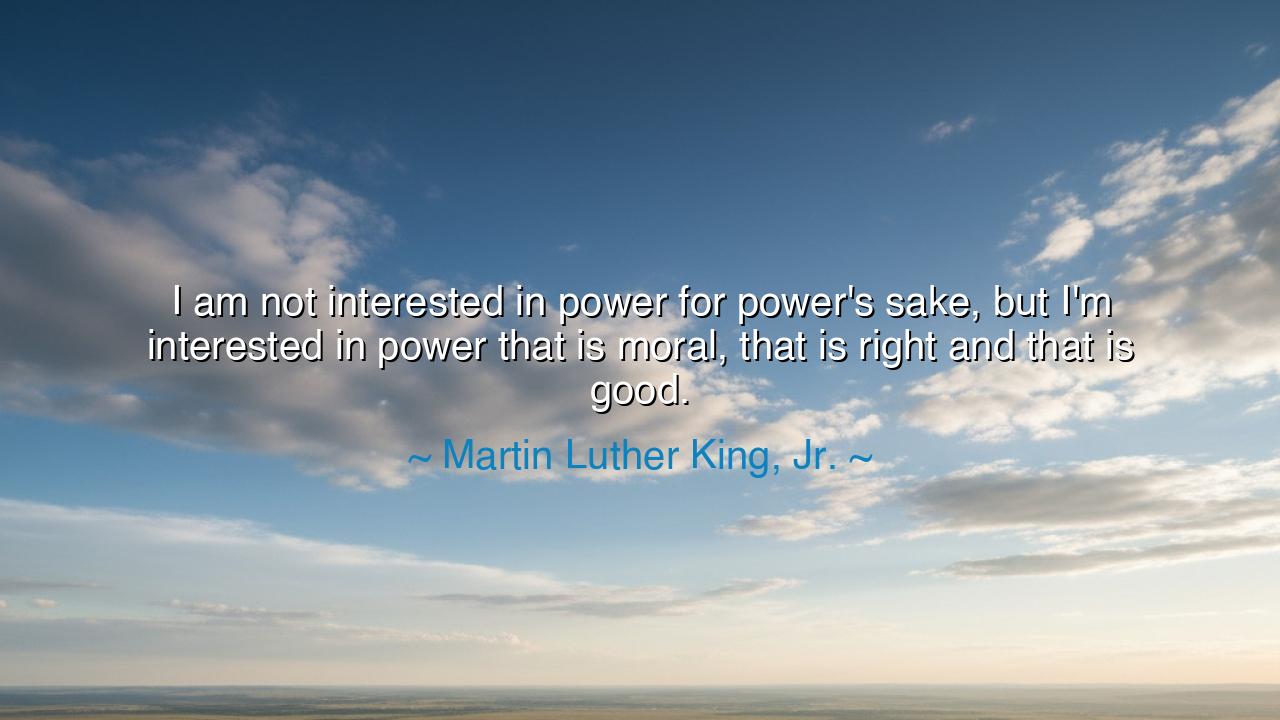
I am not interested in power for power's sake, but I'm
I am not interested in power for power's sake, but I'm interested in power that is moral, that is right and that is good.






Martin Luther King, Jr., prophet of justice and dreamer of freedom, declared with holy fire: “I am not interested in power for power's sake, but I'm interested in power that is moral, that is right and that is good.” In this saying, he separates the shadow from the light, reminding us that power itself is not evil, but its purpose determines its worth. To seek power for power’s sake is vanity, corruption, and tyranny. But to seek power that is moral, rooted in justice and love, is to transform it into a force of healing and liberation.
The heart of this teaching is the redefinition of power. Too often men think of it as domination—the ability to bend others to their will. But King reminds us that true greatness lies in power that is right and good, power that lifts the oppressed, heals division, and brings dignity where there was shame. Such power is not selfish, but sacrificial; it is not the lion’s roar to terrify, but the shepherd’s staff to guide.
History echoes this truth. The Roman emperors sought power for themselves, and though their legions conquered the known world, their thrones crumbled beneath the weight of corruption. By contrast, Abraham Lincoln, wielding power not for its own glory but for the liberation of slaves and the preservation of a union, transformed a nation’s destiny. His authority was tested in fire, but because it was anchored in what was moral and right, it endures as a beacon of just leadership.
King himself embodied this principle. Facing dogs, fire hoses, prisons, and bullets, he did not reject power, but redefined it. His marches, speeches, and acts of nonviolent resistance were not a thirst for dominance, but a demand for a moral order. His dream was not of a throne, but of a table where all could sit in equality. Thus he showed the world that power, sanctified by justice, becomes not oppression but freedom.
O children of tomorrow, engrave this upon your hearts: seek not power for power’s sake, for it will corrupt your soul and perish in time. Seek instead power that is moral, right, and good, for such power endures, uplifts, and redeems. King’s voice, echoing across the ages, calls you to remember: greatness is not in ruling others, but in serving them; not in exalting the self, but in building a world where justice and mercy kiss.






DDuLL
I think this quote speaks to something fundamental about leadership. The pursuit of power without a moral compass can lead to destruction. But how can we be sure that a person wielding power truly understands what is 'right' or 'good'? What if their sense of morality is flawed or biased? In a world full of competing ideologies, is it even possible to agree on what constitutes moral power?
Tt
King’s perspective on power is refreshing. It raises the question of whether we as a society value moral integrity in our leaders enough. Too often, power seems tied to status or control, rather than being a tool for good. How can we encourage leaders to use power in a way that’s ethically sound? Do we, as individuals, do enough to challenge the misuse of power when we see it, or do we remain passive?
NLNguyen Luan
This quote is inspiring, especially in today’s world where power is so often pursued for its own sake. But how do we define ‘moral power’? Who gets to decide what is morally right? In some situations, what one person sees as moral, another might see as a misuse of power. Is it possible for anyone to wield true moral power without it being corrupted over time? What safeguards should we put in place?
TTNguyen Thanh Truong
I really appreciate the distinction Martin Luther King, Jr. makes between power for its own sake and moral power. It makes me wonder—how often do we see power being used for selfish or unjust purposes? It’s easy to see how power can corrupt, but can it also be used for the greater good in a way that is truly moral? What does it take for someone in power to consistently use it for good without being swayed by personal interests?